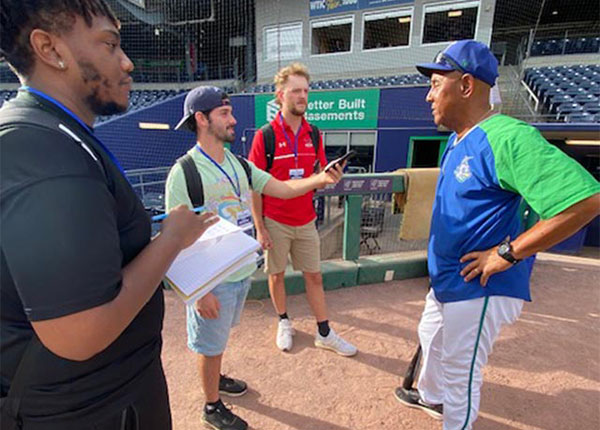

Gulian Marconi ’26 is one of three students enrolled in this fall’s Sports Journalism course who was selected to cover batting practice before the Yard Goats’s first-ever home playoff game, against the Somerset Patriots in their Eastern League Northeast Division Series Final at Dunkin’ Park. “That experience was so valuable,” says Gulian, a digital media and journalism major and politics and government minor, who is now considering sports journalism as a career. “Reporting from the ballpark was a fun glimpse into live reporting. We got to enjoy the game from our outfield seats and write our assignment at the same time.”
Gulian and his classmates had access to the minor league team’s General Manager Bobby Meacham before the game and were assigned several reporting positions including live posting on the social media platform X. School of Communication Associate Professor Abe Hefter teaches the Sports Journalism course and says students produced “game-over” broadcast and print stories on a very tight deadline. Hefter says students report on the teams as accredited, working journalists, with interview access to players and coaches.
“I wanted the students to feel the pressures associated with writing to deadline, while juggling many editorial demands,” says Hefter. “That meant watching the game, taking notes, assimilating all the information, and writing a game-over story based on what they saw on the field. Students who wrote print stories wrote to 'word count.' Students who produced audio/broadcast reports wrote to 'time.' And they needed to submit their reports no longer than 15 minutes after the final out.”
“The course is very thoughtful and covers relevant topics, and it really emphasized the connection between what we are working on and what we are working toward,” says Gulian. “The assignments are manageable with an emphasis on timeliness and execution, and I’ve enjoyed the trips to nearby sports games.” Other Sports Beat students also reported on a Wolf Pack hockey game at the XL Center from the press box, where they also produced either a print or audio/broadcast game-over story to deadline.
Hefter says especially grateful for the assistance of Alex Thomas, the Wolf Pack’s manager of broadcasting and public relations, and Jeff Dooley, the Yard Goat’s director of broadcasting and media relations. This spring, he is teaching a Sports Beat-Wolf Pack course, where students cover the Wolf Pack 'beat' exclusively and report on five Wolf Pack games from the XL Center. “As accredited members of the media, my students will also have access to the head coach for his post-game ‘coach's conference’,” he says. The students will produce a weekly Wolf Pack Podcast in the School of Communications podcast studio.
Gulian advises students looking attend the School of Communication, “If you are enthusiastic and willing to put the time in, the programs will put their time back into you. There’s a space for everyone to find their niche.” Gulian has taken his own advice and is managing editor for the UHart student newspaper, The Informer, and is a member of UHart’s Track & Field and Cross Country teams. “My favorite thing about UHart is my teams. And not just my sports teams—my academic peers, my team at the newspaper, and my group of good friends.”
Abe Hefter, Associate Professor, College of Arts and SciencesI wanted the students to feel the pressures associated with writing to deadline—watching the game, taking notes, assimilating all the information, and writing a game-over story based on what they saw on the field— then they need to submit their reports no longer than 15 minutes after the final out.